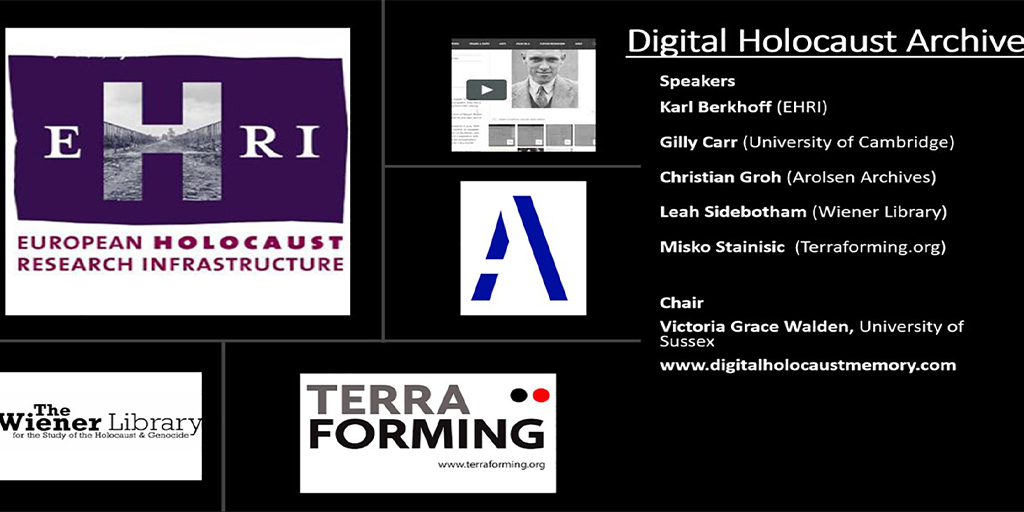
Digital Holocaust Archives – Online Discussion
On Thursday 1st October, we hosted five speakers working on different Holocaust archive projects in Europe. Wolfgang Ernst has argued that digital technologies transform the very idea of what archives are and can be. Traditionally, the archive has been conceptualised (in theory at least) as a place guarded by archons (see Derrida), who control the discourse of history, where material objects are kept in static storage until they are brought for viewing by those granted access.
For Ernst though, the Internet provides the potential for more dynamic archival spaces and for the creation of archives or archives. How does such a suggestion impact Europe’s Holocaust archives? In the following recordings, our speakers explore sustainability of digital archives, participatory practices, and the potentials and limitations of the digital for the future of Holocaust research.
EHRI

Our first speaker was Dr. Karel Berkhoff, a Historian of Eastern Europe (particularly Ukraine and the Soviet Union), the Holocaust, and World War II. He is a Senior Researcher at the NIOD – Institute for War, Holocaust and Genocide Studies (at the Royal Netherlands Academy of Arts and Sciences). His publications include: Harvest of Despair: Life and Death in Ukraine under Nazi Rule (2004) and Motherland in Danger: Soviet Propaganda during World War II (2012). He spoke to us in this presentation about the European Holocaust Research Infrastructure. A major project funded by the European Union of which he is scientific coordinator and co-director.
Frank Falla Archive

Our second speaker was Gilly Carr, a Senior Lecturer and Academic Director in Archaeology at the University of Cambridge Institute of Continuing Education. She is also a Fellow and Director of Studies in Archaeology at St Catharine’s College and a Partner of the Cambridge Heritage Research Centre. Gilly is on the UK delegation of the International Holocaust Remembrance Alliance (the IHRA) and on the academic advisory board of the UK Holocaust Memorial Centre. She is currently chairing the IHRA project ‘Safeguarding Sites’, which is writing best practice guidelines to safeguard Holocaust sites in Europe. She spoke to us about her Frank Falla Archive, which documents the experiences of those living in the Channel Islands under Occupation, who were deported to Nazi Concentration Camp across Europe.
Arolsen Archives

Arolsen Archives
Next, we heard from Christian Groh, Head of Archives at Arolsen Archives. He studied History, and English Language and Literature in Heidelberg before completing an MA in History and English, and History Doctorate at the same university. His dissertation focused on the organisation and practices of local police forces in postwar Germany. Before joining Arolsen Archives, he was a historian and archivist at City Archives Pforzheim, where he then moved up to acting, deputy and 2010 director.
Wiener Library

Then we heard from Leah Sidebotham, Digital Asset Manager at The Wiener Holocaust Library where she leads the organisation in making the most of and preserving its digital assets. Most recently she worked on the Library’s new website Testifying to the Truth (launching late 2020) which aims to make the Library’s invaluable collection of eyewitness testimonies gathered in the 1950s/60s accessible online. She recently completed a Masters in Digital Asset and Media Management at KCL, where her dissertation focused on the relationship.
Terraforming

Finally we heard from Miško Stanišić, co-founder and director of Terraforming, an NGO based in Novi Sad in Serbia committed to promoting and improving teaching and learning about the Holocaust and combating antisemitism, antigypsyism and other forms of xenophobia. Interested in exploring ways to engage new multipliers in education about the Holocaust, such as archivists and librarians, Miško developed the “International Library Platform for Teaching and Learning about the Holocaust” – a project awarded with Yehuda Bauer Grant by International Holocaust Remembrance Alliance IHRA. Another innovative concept is “Ester” – a series of digital graphic novels about the Holocaust based on cooperation with local archives and authentic sites. The latest project Miško is engaged with is “Holocaust, European values and local history” with aim to introduce archival pedagogy in smaler local archives, and safeguard microhistories of the Holocaust. Miško Stanišić is member of the IHRA delegation of the Republic of Serbia, and member of the IHRA Education Working Group as well as the Committee on the Genocide of the Roma.
There was a lively chat throughout the session, with two questions left for more in-depth discussion in the Q&A:
Question 1: What issues do we face regarding the sustainability of digital archives?
Question 2: To what extent do Holocaust archives work with Jewish genealogists?
For those interested in exploring digital visualisation and other ways of working with big data related to the Holocaust or other humanities topics, it’s worth checking out these resources:
Two of the questions the Digital Holocaust Memory project has been thinking about regarding archiving are:
- How can we archive not only the institutional broadcasts of the online-only 75th anniversary commemoration events held in 2020, but also the emotional engagement of participants via social media impressions? See more about this here.
- Given the diversity of platforms and formats that digital Holocaust memory has taken, how can we create an online archive that makes such projects, and those related to other genocides, more accessible for researchers across the world?
What other questions do we still have to answer?